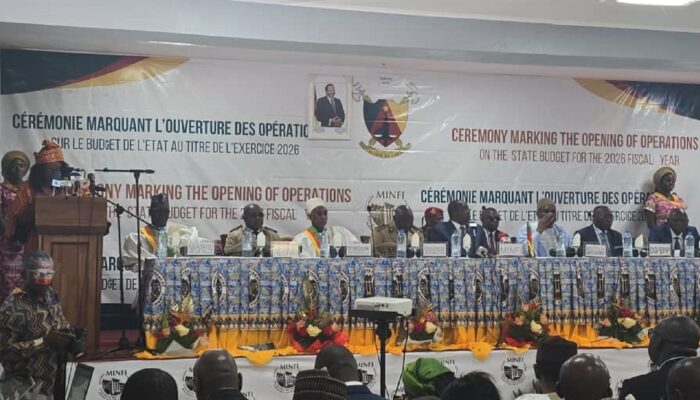The participation of Finance Minister Louis Paul Motaze and Economy Minister Alamine Ousmane Mey in the IMF Annual Meetings in Washington, D.C., from October 13 to 18, 2025, confirmed Cameroon’s credibility with its partners, while paving the way for a new cycle of cooperation based on the consolidation of reforms, fiscal sustainability, and productive investment.
Cameroon’s Minister of Finance, Louis Paul Motaze, participated in the Annual Meetings of the International Monetary Fund (IMF) and the World Bank in Washington, D.C., from October 13 to 18, 2025, along with his colleague Alamine Ousmane Mey, Minister of Economy, Planning, and Regional Development. The meeting was marked by high-level discussions on Cameroon’s economic trajectory, the reforms underway, and the possibility of a new program with the Bretton Woods institutions. “We had very good discussions here in Washington during these annual meetings of the IMF and the World Bank. As always, there were much more thematic discussions because we met with international banks, as well as the IMF’s financial affairs department,” said Minister Louis Paul Motaze at the end of the meeting.

At the heart of the discussions was the quality of the reforms carried out in recent years by the Cameroonian government, particularly in the tax sector and the digitalization of public services, notably at Customs, the Treasury and Tax Administration, as well as in payroll and career management. “The IMF is already providing us with a great deal of assistance, and its officials acknowledged that enormous efforts have been made in terms of digitalization.” “The goal is for us to collect more taxes, but without having to increase the pressure on the same people,” emphasized Louis Paul Motaze. “That’s often the problem: some complain that they’re always the ones paying. We therefore need to broaden the tax base so that the burden is better shared.” The Minister of Finance welcomed the positive results of the second three-year program supported by the IMF, which expires in 2025. “We had an extremely important working session with the IMF’s Africa Director, assisted by his deputy.
Also present was the woman who will now be the IMF’s mission chief for Cameroon. During this discussion, we essentially reviewed, or if I may say so, evaluated, the two programs we completed. Everyone noted that things went well: we achieved 41 structural benchmarks set out in the program, almost all of which have been met.” The question now is: what next?, as they say here in Washington at IMF headquarters.”
Thus, regarding the continuation of cooperation with the IMF after the end of the program concluded in 2021 last July, Louis Paul Motaze, the Minister of Finance, made no secret of Cameroon’s interest in a new support framework, provided it takes into account the country’s domestic priorities. “I cannot preempt the decision that will be made by our superiors, but it is clear that certain problems arise that may argue in favor of a new program.
First, there are reforms that have been implemented: they will need to be continued, some strengthened, and others internalized. When I say internalize, I mean that, very often, reforms are carried out because we were asked to. And once they are completed, we tend to forget about them.” They must therefore be fully integrated, particularly in the management and evaluation of public enterprises, as well as in the systematic organization of meetings between the public and private sectors. This, in my opinion, is a fundamental reason to continue along this path.” Among the areas discussed were the governance of public enterprises, the systematic organization of public-private dialogue, and the regular evaluation of economic performance.
The Minister also recalled the concrete contributions of the two previous programs concluded with the IMF and other donors, and the risk of some funding drying up if another program were not concluded: “A second reason, which seems extremely important to me, deserves to be emphasized: these two programs have allowed us to benefit from what is called budgetary support, from the IMF and other development partners such as the World Bank, the African Development Bank, France, etc. We have thus mobilized more than 2.6 trillion CFA francs.” If this support were to stop, there would necessarily be a hole in the budget that would have to be filled.
We will have to find the means to finance it. This is also an aspect that must be considered.
Cameroon, the economic pillar of the sub-region, plays a central role in the financial stability of CEMAC. “Cameroon represents almost half of CEMAC’s reserves and GDP. If Cameroon isn’t a sub-program, what would be the point of the CEMAC sub-program?” asked Louis-Paul Motaze, emphasizing the regional dimension of the discussions held in Washington and the need to frame relations between Cameroon and the IMF within a regional perspective. But for the minister, a new program must also incorporate the expectations expressed by the population during the recent presidential election. “Like any democratic government, we listened to what the citizens said, whether they voted for us or not. A future program must take into account the need to invest more to create jobs, particularly for young people, and accelerate the construction of infrastructure.” »
With a budget deficit reduced to 1.5% of GDP – compared to over 6% in 2017 – Cameroon has restored its fundamentals. But beyond this remarkable recovery in public finances, the minister now wants “a shift” toward inclusive growth. “We currently have a budget deficit of 1.5%. Everyone applauded this because we went from around 7% in 2017, at the start of the first program, to only 1.5% today. This is a very good performance.
But does this allow for more investment to create jobs, particularly for young people, and address the infrastructure problems we are experiencing? There is a lot of thought to be given to this, even in the event of a new program, to see how to introduce a shift in a number of areas and more directly address the problems raised by the population.”
At the end of his discussions with the IMF’s Africa director and the future mission chief for Cameroon, Louis Paul MOTAZE expressed satisfaction with the quality of the dialogue. “We agreed that they will wait for Cameroon’s position. We are open to a program, but everything will depend on the type of program. The important thing is that it is aligned with our national priorities and our development imperatives,” concluded Finance Minister Louis Paul MOTAZE.





